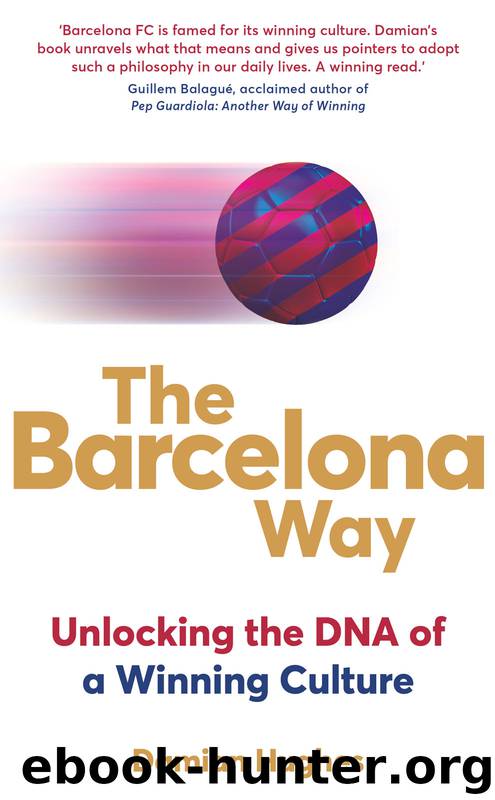The Barcelona Way by Damian Hughes

Author:Damian Hughes
Language: eng
Format: epub
Publisher: Pan Macmillan UK
EXERCISE – HOW TO GET (FEEDBACK) RICH OR DIE TRYING
Consider the life of a typical twenty-something. From the moment she was born, her world has been rich in feedback. When she presses a button, something happens. When she plays a video game, she gets a score. When she sends a text message, she hears a sound that confirms it went out. She has lived her whole life in a landscape lush with feedback.
However, once she steps into the workplace, the main – often the only – mechanism for giving her information on how she’s doing on the job is the annual performance review. She goes from feast to a famine of feedback in the place she spends most of her waking hours.
This sturdy feature of organizational life is deeply flawed in at least two ways.
First, it’s annual. It’s hard to get better at something if you receive feedback on your performance just once a year. Think about Rafael Nadal. His job is to hit tennis balls back and forth across a court. Now imagine if Nadal played tennis for an entire season – and got feedback on his performance only once a year in a forty-five-minute meeting with his coach. Absurd, right?
Second, performance reviews are rarely authentic conversations. More often, they are meetings in which people recite predictable lines in a formulaic way and hope the experience ends very quickly.
The workplace is one of the most feedback-deprived places in modern life.
Fortunately, it needn’t be that way. Let me suggest a couple of modest strategies for making the workplace a little more feedback-rich.
1. Do it yourself
Formal performance appraisals have their place. But we should supplement them with evaluations we do ourselves. Here’s how a DIY performance review would work: at the beginning of the month, set out your goals – your performance goals and your learning goals. Then, at the end of the month, call yourself into the office. Where are you making progress? Where are you falling behind? What tools or information do you need to do your job better?
If a conversation with yourself seems odd, try it with a few colleagues. Indeed, many top-performing teams already do this as a matter of course – often without the boss’s permission, sometimes without the boss even knowing. This ethic of self-evaluation is also a hallmark of star athletes and great musicians. They set high standards for themselves and then meticulously monitor their own progress.
2. Do it through peers
I worked with one company who introduced a peer-to-peer approach, where anybody at any time can award a colleague a £25 bonus.
Instead of once-a-year acknowledgment from a boss who may not remember your heroic deeds, these modest bonuses allow colleagues to recognize good work instantly – and that, in turn, can create an environment in which feedback more regularly bursts through into office life.
A person’s supervisor must sign off on each award, but ultimately the decision rests with peers, not bosses – which can make the feedback and recognition more meaningful. It puts the feedback control in the hands of the people who are closest to the activity.
Download
This site does not store any files on its server. We only index and link to content provided by other sites. Please contact the content providers to delete copyright contents if any and email us, we'll remove relevant links or contents immediately.
Hit Refresh by Satya Nadella(8373)
The Compound Effect by Darren Hardy(7639)
Change Your Questions, Change Your Life by Marilee Adams(6704)
Nudge - Improving Decisions about Health, Wealth, and Happiness by Thaler Sunstein(6685)
The Black Swan by Nassim Nicholas Taleb(6258)
Daring Greatly by Brene Brown(5696)
Deep Work by Cal Newport(5584)
Principles: Life and Work by Ray Dalio(5380)
Rich Dad Poor Dad by Robert T. Kiyosaki(5212)
The Myth of the Strong Leader by Archie Brown(4821)
Man-made Catastrophes and Risk Information Concealment by Dmitry Chernov & Didier Sornette(4805)
Big Magic: Creative Living Beyond Fear by Elizabeth Gilbert(4781)
The Slight Edge by Jeff Olson(4758)
Discipline Equals Freedom by Jocko Willink(4673)
Digital Minimalism by Cal Newport;(4661)
The Motivation Myth by Jeff Haden(4575)
Stone's Rules by Roger Stone(4458)
Management Strategies for the Cloud Revolution: How Cloud Computing Is Transforming Business and Why You Can't Afford to Be Left Behind by Charles Babcock(4158)
The Doodle Revolution by Sunni Brown(4083)
